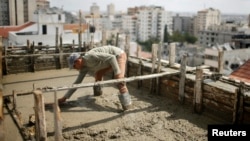GAZA —
The U.N. said on Tuesday it had halted work on all but one of its 20 Gaza building projects as a result of an Israeli ban on importing building materials into the Palestinian enclave.
Israel imposed the ban after discovering on Oct. 13 a 2.5-km (1-1/2-mile) tunnel which it said militants planned to use for attacks inside its territory. Islamist Hamas, which has run the Gaza Strip since 2007, claimed it dug the tunnel.
“We are in now in the fourth week (in which) we are not allowed to bring in construction material,” Robert Turner, director of Gaza operations for the United Nations Relief and Works Agency (UNRWA), said.
“We do not know when we will be allowed to restart these projects,” he said, calling for the ban to be lifted.
He told reporters that the only building project still under way, a bridge, was also running out of building materials. The others included 12 schools and a health center.
A spokesman for the Israeli government agency that oversees shipments into Gaza gave no indication when the import ban might be lifted.
“For security reasons, building materials are not allowed into Gaza for the time being,” he said.
UNWRA's Turner said the economic situation in the territory, where unemployment, according to U.N. figures, is at 30 percent, has worsened following Egypt's closure of smuggling tunnels under its border with Gaza.
Egypt's military-run government, which has been battling Islamist militants in the Sinai Peninsula near Gaza, regards Hamas as a security threat. Hamas has denied Cairo's accusations it has been involved in Egyptian unrest.
Tunnels had provided an commercial lifeline for Gaza in the face of Israeli-led economic sanctions. They were also used by militant groups to smuggle in weapons and funds.
Local economists say the tunnels' closure has forced about 20,000 Gazans out of jobs and caused consumer prices to spike.
“We see no positive indicators for Gaza. We do not see at any level or any sector where the situation is improving and that obviously is very worrying,” said Turner, whose agency provides food aid to 830,000 of Gaza's 1.8 million population.
In Jerusalem, Yosef Kuperwasser, director-general of Israel's Strategic Affairs Ministry, told reporters that the tunnel Hamas built into Israel showed that its desire to carry out cross-border attacks outweighed economic considerations.
Israel imposed the ban after discovering on Oct. 13 a 2.5-km (1-1/2-mile) tunnel which it said militants planned to use for attacks inside its territory. Islamist Hamas, which has run the Gaza Strip since 2007, claimed it dug the tunnel.
“We are in now in the fourth week (in which) we are not allowed to bring in construction material,” Robert Turner, director of Gaza operations for the United Nations Relief and Works Agency (UNRWA), said.
“We do not know when we will be allowed to restart these projects,” he said, calling for the ban to be lifted.
He told reporters that the only building project still under way, a bridge, was also running out of building materials. The others included 12 schools and a health center.
A spokesman for the Israeli government agency that oversees shipments into Gaza gave no indication when the import ban might be lifted.
“For security reasons, building materials are not allowed into Gaza for the time being,” he said.
UNWRA's Turner said the economic situation in the territory, where unemployment, according to U.N. figures, is at 30 percent, has worsened following Egypt's closure of smuggling tunnels under its border with Gaza.
Egypt's military-run government, which has been battling Islamist militants in the Sinai Peninsula near Gaza, regards Hamas as a security threat. Hamas has denied Cairo's accusations it has been involved in Egyptian unrest.
Tunnels had provided an commercial lifeline for Gaza in the face of Israeli-led economic sanctions. They were also used by militant groups to smuggle in weapons and funds.
Local economists say the tunnels' closure has forced about 20,000 Gazans out of jobs and caused consumer prices to spike.
“We see no positive indicators for Gaza. We do not see at any level or any sector where the situation is improving and that obviously is very worrying,” said Turner, whose agency provides food aid to 830,000 of Gaza's 1.8 million population.
In Jerusalem, Yosef Kuperwasser, director-general of Israel's Strategic Affairs Ministry, told reporters that the tunnel Hamas built into Israel showed that its desire to carry out cross-border attacks outweighed economic considerations.





